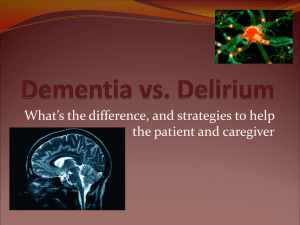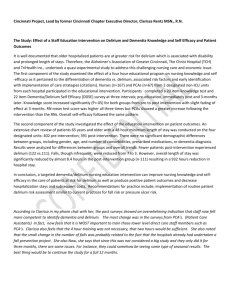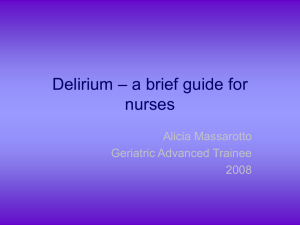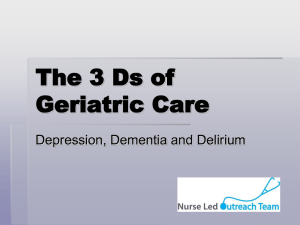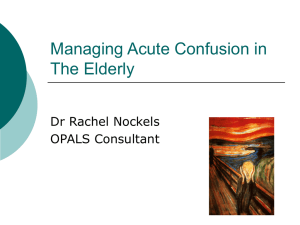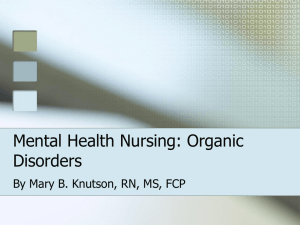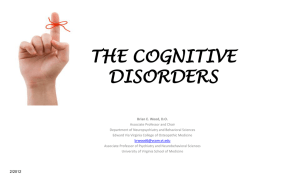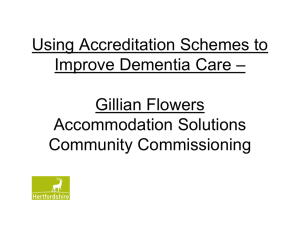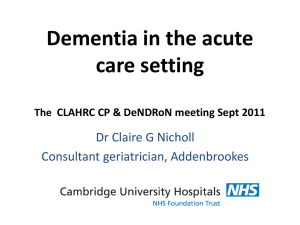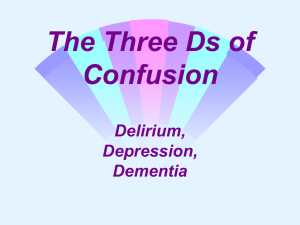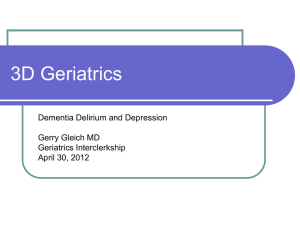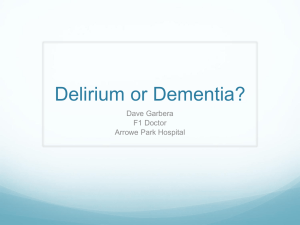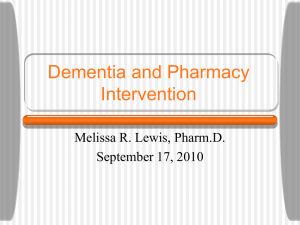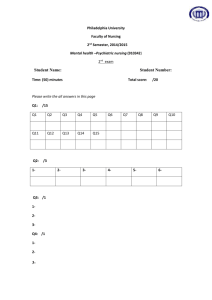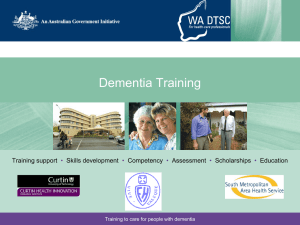Organic Mental Disorders - New York Medical College
advertisement
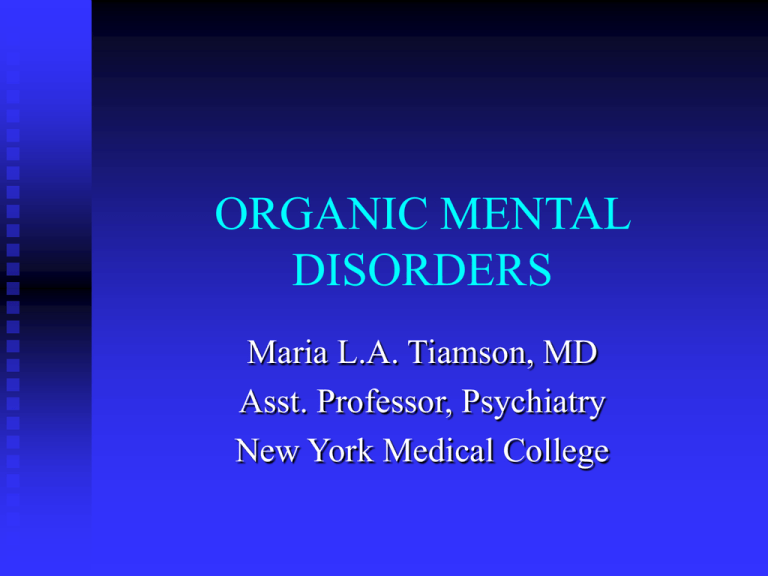
ORGANIC MENTAL DISORDERS Maria L.A. Tiamson, MD Asst. Professor, Psychiatry New York Medical College DSM-IV Delirium Dementia Amnestic Disorders Subcategories: caused by general medical condition, substance use or NOS Common Primary Symptom: cognitive impairment DELIRIUM CORE SYMPTOM: impairment of consciousness, ie. reduced ability to focus, sustain or shift attention acute onset and fluctuates direct physiologic consequences of a general medical condition a MEDICAL EMERGENCY !!! Epidemiology of Delirium 15-18% of med-surg 30% of post-CABG 50% of post-hip surgery frequently misdiagnosed Risk Factors of Delirium extremes of age (old & young) burns (3rd degree) post-cardiotomy patients drug dependence HIV/AIDS pre-existing brain damage history of delirium URGENT Diagnosis Withdrawal/Wernicke’s Hypertensive encephalopathy Hypoglycemia Hypoperfusion of CNS Hypoxemia Intracranial bleed Meningitis/encephalitis Poisons/Medications Clinical Features of Delirium Prodrome Temporal course Attentional deficits and arousal Orientation Language and cognition Perception Mood Other symptoms Clinical Course of Delirium Diagnosis: rating scales, bedside exam, labs and other diagnostic tests, review of medications (including OTC drugs and illicit drugs Course Prognosis Pathophysiology of Delirium Areas of the brain affected: prefrontal cortex, right cerebral hemisphere, subcortical nuclei Neurotansmitters affected: acetylcholine dopamine GABA histamine Treatment of Delirium Etiological: VERY IMPORTANT Symptomatic: neuroleptics benzodiazepines DEMENTIA Syndrome of acquired persistent impairment in intellectual function: memory, language, visuospatial skills, emotion or personality, and cognition Effect of pathological processes on the brain, NOT THE EFFECT OF AGING Epidemiology of Dementia 4 million severe dementia 1-5 million mild to moderate 50-60% Alzheimer’s dementia 15-30% Vascular dementia 1-5% Other causes 15% are reversible Classification of Dementia CORTICAL: Alzheimer’s SUBCORTICAL: HAD, Parkinson’s, Huntington’s MIXED: Vascular Pseudodementia Risk Factors for Dementia ALZHEIMER’S: female, hx of 1st degree relative with AD, hx of Down’s, hx of head trauma MULTI-INFARCT DEMENTIA (Vascular): male, HTN, 60-70 y/o H.A.D.: wasting syndrome, older age at dx, substance abuse hx Clinical Features of Dementia Memory Orientation Language changes Personality changes Perceptual changes Other symptoms Cortical Dementias Amnesia Apraxia Aphasia Agnosia diffuse atrophy with flattened sulci anf enlarged ventricles senile amyloid plaques, neurofibrillary tangles Vascular Dementias Stepwise deterioration of functioning affects small and medium sized cerebral vessels multiple parenchymal lesions spread over wide areas of the brain Subcortical Dementia Apathy, depression, psychomotor retardation affects frontal lobe, basal ganglia, thalamus disruption of fundamental cerebral functions: arousal, attention, motivation and rate of information processing Pseudodementia Dementia syndrome of depression “don’t know” answers typical attention and concentration well preserved indifference to cognitive impairment Treatment of Dementia Etiologic: cholinesterase inhibitors: tacrine, donepezil, revastigmine, metrifonate HAART Treatment of co-morbid conditions: depression, agitation, psychosis Adjunctive treatments: vit.E, hydergine, selegeline, ginkgo biloba Treatment of Dementia Supportive treatment creating a safe environment Psychotherapy Legal issues Amnestic Disorders Single symptom of a memory disturbance that causes significant impairment in functioning anterograde amnesia retrograde amnesia Major Causes of Amnesia Systemic medical conditions Primary brain conditions Substance related causes Affects dorsomedial and midline thalamic nuclei, hippocampus, mammilary bodies, amygdala Treatment of Amnesia Etiological Psychotherapy

